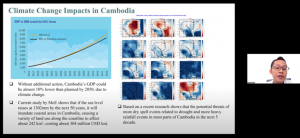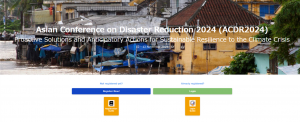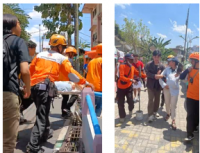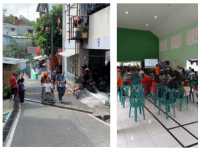19 August 2024

According to Dr Hak Mao (Director, Department of Climate Change) and Mr Sem Savuth (Vice Chief, Climate Change Information Management, Department of Climate Change), 44% of all communes in Cambodia are vulnerable to the increasing frequency and intensity of flood, drought, and storm due to climate change. By 2050, when sea-level rise is projected to reach 1,302mm, about 242km2 of coastal areas in Cambodia will be inundated, resulting to an estimated economic loss of USD304 million. If the government does not offer additional action to combat the impacts of climate change, the planned GDP for 2050 will be 10% lower.
When this information was presented at the 3rd Webinar series on Climate Change Projection for Disaster Risk Reduction in Asia-Pacific Region on 19 August 2024, panelists and participants were interested to know about climate change countermeasures as well as the challenges in Cambodia. In response, Dr Mao and Mr Savuth said that like other countries in the region, Cambodia enacted policies and regulations to adapt to climate change and mitigate its impacts. Some of the climate change countermeasures are aimed at: i) increasing the current 62% usage of renewable energy to 70% by 2030; ii) ensuring that 70% of motorcycles and 40% of cars are EVs by 2050; and iii) planting of one million trees annually until 2050 to achieve 60% forest cover. The main challenge, however, is that these are broad actions that don't project specific impacts caused by climate-related disasters, such as extreme flood or storm. In order to do this, downscaled climate data is essential. Currently, historical climate data in Cambodia is sparse. This problem is compounded by limited tools and technologies within the government to measure the impacts or to make accurate projections of climate change.
In view of these concerns, other panelists introduced some of the initiatives and tools for climate change projection that may complement the ongoing climate actions in Cambodia. Prof. MORI Nobuhito (Research Division of Atmospheric and Hydrospheric Disasters, Disaster Prevention Research Institute, Kyoto University) introduced the SENTAN Program, and the potential collaboration with Cambodia, for assessing the effects of extreme water-related events and analysing the changes of hazards with rising global surface temperature as downscaled to countries in the Asia-Pacific region. Dr NAKAEGAWA Toshiyuki (Head of Second Laboratory, Department of Applied Meteorology Research, Meteorological Research Institute of Japan Meteorological Agency) introduced tools using high-resolution models and supercomputers to project a future climate at the local level. Dr MURATA Akihiko (Head of First Laboratory, Department of Applied Meteorology Research, Meteorological Research Institute of Japan Meteorological Agency) introduced tools and methods for dynamical downscaling to simulate localised climate change. Mr MORI Noriyuki (Deputy Director, International Center for Water Hazard and Risk Management) introduced a comprehensive platform on water resilience and disasters that includes data-integration for hazard, damage, and socioeconomic factors. On this platform, various agencies provide their respective climate data for integration in order to effectively forecast the impacts and provide early warning to communities-at-risk.
In his closing remarks, Prof. TACHIKAWA Yasuto (Hydrology and Water Resources Research Laboratory, Kyoto University) emphasised the potential contributions of SENTAN Program (e.g., tools, technologies, and datasets) to climate change countermeasures that countries in Asia-Pacific region are undertaking. He hoped that the webinar will foster greater collaboration between SENTAN Program and Cambodia.
(2024/08/26 15:00)






